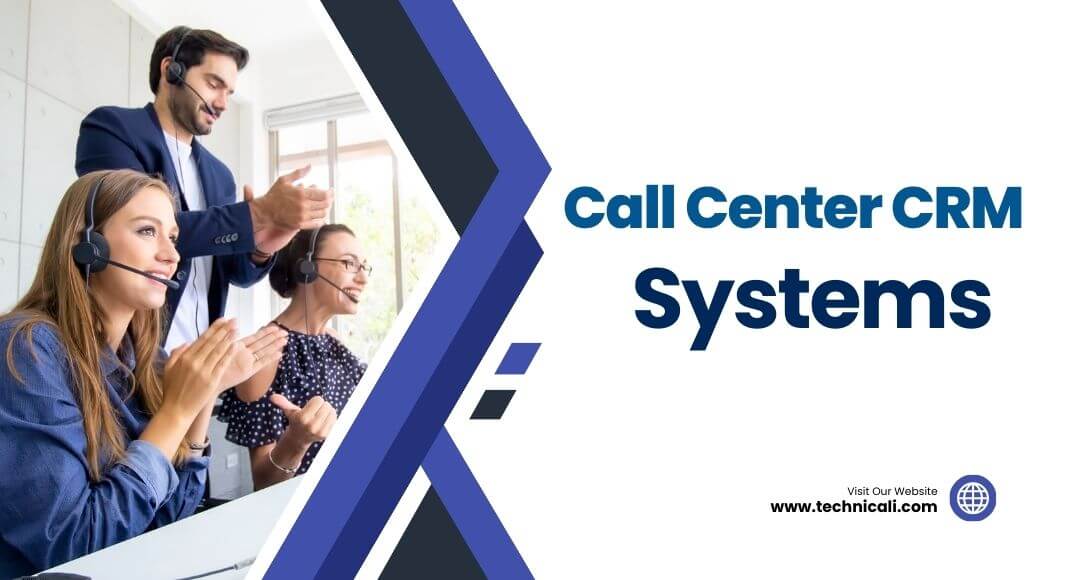The striking difference emerges when a robust CRM solution stands behind the scenes, helping to manage customer interactions and minimize service bottlenecks. Yet many center operations still struggle with inefficiencies. A lack of real-time insights, low agent morale, and high turnover often plague environments that have not found the right CRM platform. To address customer needs at scale, businesses should leverage the best call center CRM software, especially when looking to support inbound and outbound workflows across multiple channels.
Contents
Why Your Call Center Needs a CRM System
What is a Call Center CRM
A call center CRM refers to a software tool that call center agents use to enhance daily tasks and improve customer service. It borrows from customer relationship management concepts through the centralization of customer data, automation capabilities, and the elimination of tedious processes. Such CRM software for call centers makes call routing possible in accordance with predefined agent skill sets. The correct employee receives the call, and customers are served quickly and effectively.
Industry experts usually define a call center CRM system as one that not only records contact information but also gathers valuable analytics. With such an arrangement, center agents are utilized to improve resolution times and eliminate customer issues. Because it relies on a unified CRM approach, every call center technology event is logged within the CRM interface, creating better oversight and delivering the capacity to address customer pain points proactively.
Key Benefits of a Call Center CRM
Organizations often see an immediate benefit when they integrate call center CRM software into operations. Here are some core advantages:
- Faster Response Times: Call routing automation and call scripting to reduce wasted effort.
- Better Customer Experience: Real-time access to customer data and past interactions.
- Seamless Multi-Channel Support: Whether dealing with phone calls, email, chat, or social media, agents can engage customers with one all-in-one crm application.
- Data-Driven Decision Making: Analytics dashboards help leaders monitor call monitoring stats.
- Improved Agent Morale: Fewer manual tasks and more streamlined workflows.
Challenges Call Centers Face Without a CRM
Call centers without suitable CRM software may find it difficult to handle large volumes of inquiries. Teams often work in silos, with no contact center solution for bridging data from multiple channels. Frustrated call center agents can struggle to piece together customer information, risking the creation of negative customer experiences. In addition, poor center solution coordination can hurt brand reputation and escalate operational costs.
Without the need to contact multiple departments, an efficient CRM helps unify data, automate tasks such as ticketing system workflows, and store everything in one place. This reduces redundant case management steps while driving excellent customer outcomes.
2. Features to Look for in a Call Center CRM
Must-Have Features
When evaluating call center software, decision-makers should look for features like advanced integration, automation, and real-time analytics:
- CRM Integration with Call Center Software: This ensures the system will easily connect with your existing tools.
- AI-Driven Automation: Automation helps reduce manual agent work and handles inbound queries proactively.
- Real-Time Analytics and Reporting: Detailed metrics on call volume, resolution speed, and service quality.
- Unified Customer Database: A single repository that makes it easier to personalize interactions and improve customer loyalty.
- Call Recording for Training: Storing customer calls fosters agent coaching and helps handle compliance protocols.
- Multiple Channels for Outreach: Agents should be able to engage by phone, chat, and email within the CRM software interface.
How to Choose the Right CRM for Your Call Center Business
The best CRM for your team depends on budget, size, and strategic goals. Some organizations seek an affordable tool offering powerful automation. Others need a robust software tool that can scale to thousands of users and integrate seamlessly with existing management tools. Evaluate whether you require deep social media monitoring, advanced case management, or specialized contact center CRM software. If you manage customer interactions at a higher volume, a cloud-based model might offer better flexibility.
It also helps to factor in how easy it is to integrate with contact management and document management systems. If you handle specialized outbound campaigns, make sure the CRM integration supports call queues and inbound routing as well.
Top 7 Call Center CRM Systems for 2025
Following is a closer examination of seven top call center CRM solutions that vow to improve customer interaction, optimize agent processes, and better customer experiences.
1. Salesforce Service Cloud
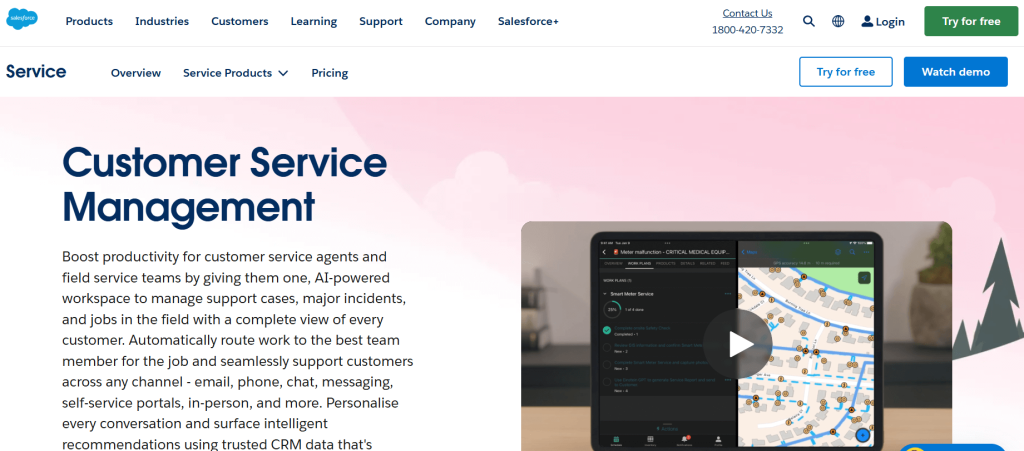
Salesforce Service Cloud is a widely recognized CRM application designed for large call centers that need advanced analytics. It often ranks as the best call center CRM software option because of its adaptable architecture.
Best for:
Large enterprises looking to scale quickly and support complex workflows.
Key Features:
AI-based workflow routing, broad integration ecosystem, robust contact center CRM capabilities.
Assets:
- Scalability for enterprise-level call centers
- Powerful CRM data analytics
- Extensive community support and third-party plugins
- Automation for repetitive tasks
- Seamless call center software integration
Liabilities:
- The steep learning curve for smaller teams
- Potentially high cost for premium tiers
- Overwhelming configuration for simple needs
- Requires dedicated admin resources
- Complex user interface for basic tasks
2. Zendesk
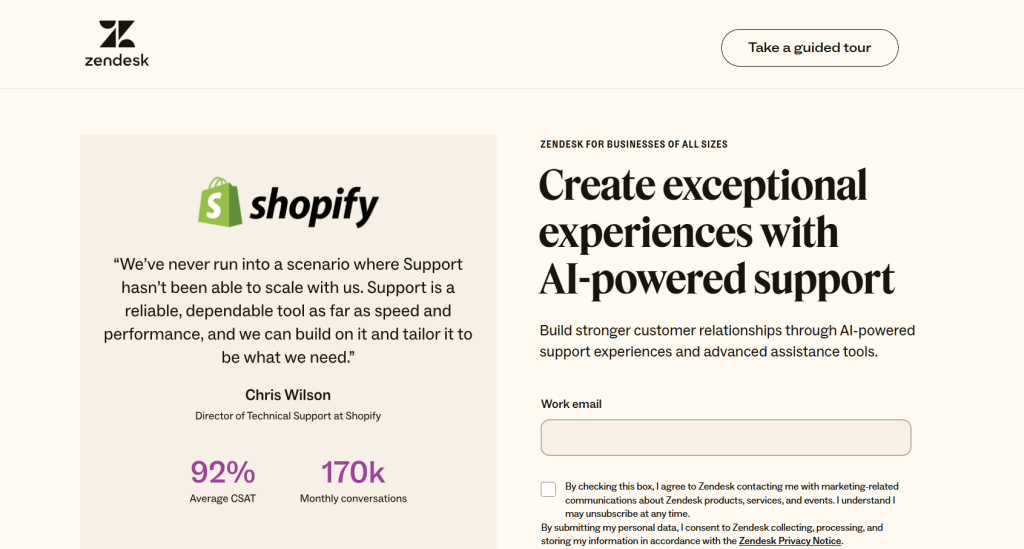
Zendesk concentrates on making it simple for call center agents to work with tickets, calls, and chats within one environment.
Best for:
Small to medium-sized businesses that need an intuitive dashboard.
Key Features:
Ticketing system, self-service portals, quick social media linking.
Assets:
- Affordable plans for growing firms
- Effortless user interface
- Wide range of app integrations
- Built-in help center articles
- Good track record in service management
Liabilities:
- Minimal customization in lower plans
- Add-ons may increase costs over time
- Lacks deep analytics in starter packages
- Less suitable for heavily specialized contact center needs
- Some advanced features, like call recording, require an extra subscription
3. HubSpot Service Hub
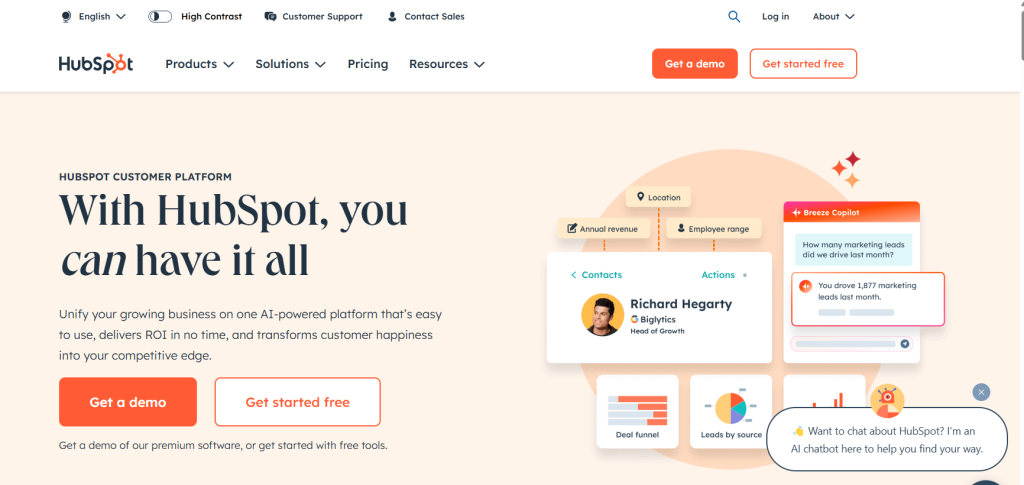
HubSpot Service Hub merges marketing and sales data with call center functions, unifying your contact center as a service.
Best For:
Marketing-driven businesses seeking an all-in-one approach.
Key Features:
CRM integration with marketing tools, detailed reporting, and chat automation.
Assets:
- Smooth bridging of marketing and sales data
- Strong community and resource library
- High-quality customer support modules
- Straightforward contact center crm setup
- Integrates well with other HubSpot hubs
Liabilities:
- Prices can climb quickly for more seats
- Focuses heavily on marketing-centric features
- May lack specialized call center technology for large inbound volumes
- Certain advanced functionalities require enterprise tiers
- Not always the best for purely service-oriented organizations
4. Talkdesk
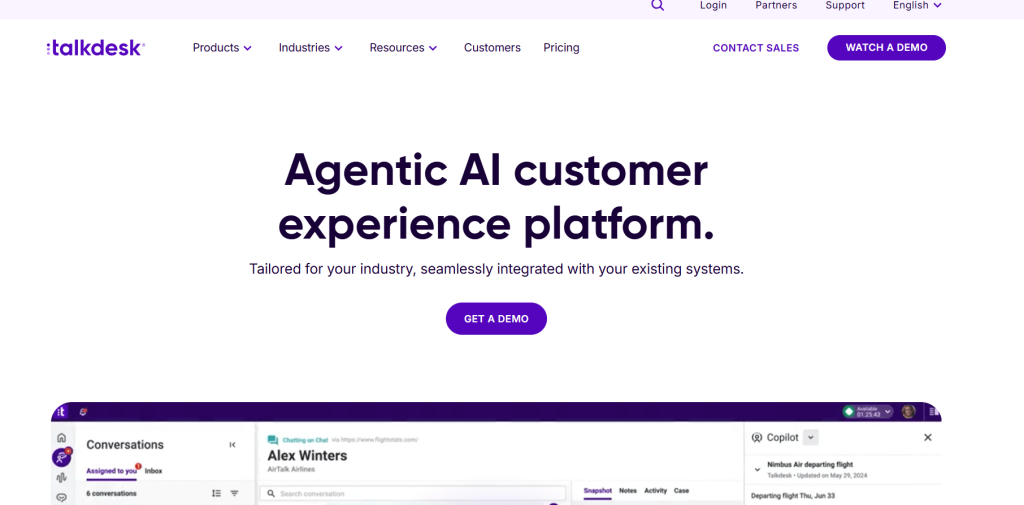
Talkdesk uses AI to handle complex calls, automate repetitive tasks, and help manage customer interactions at scale.
Best For:
AI-powered call routing for mid-sized and large call centers.
Key Features:
Intelligent workforce optimization, built-in analytics, advanced automation.
Assets:
- Real-time dashboards that measure performance
- Strong capabilities in call scripting
- Allows call distribution that is AI-driven
- Flexible contact center CRM software approach
- Cloud-based deployment for global reach
Liabilities:
- Some users find the interface unintuitive
- Integration with third-party apps may require extra steps
- Pricing can be higher than average
- Setup complexity for smaller teams
- Occasional updates might disrupt workflows
5. Five9
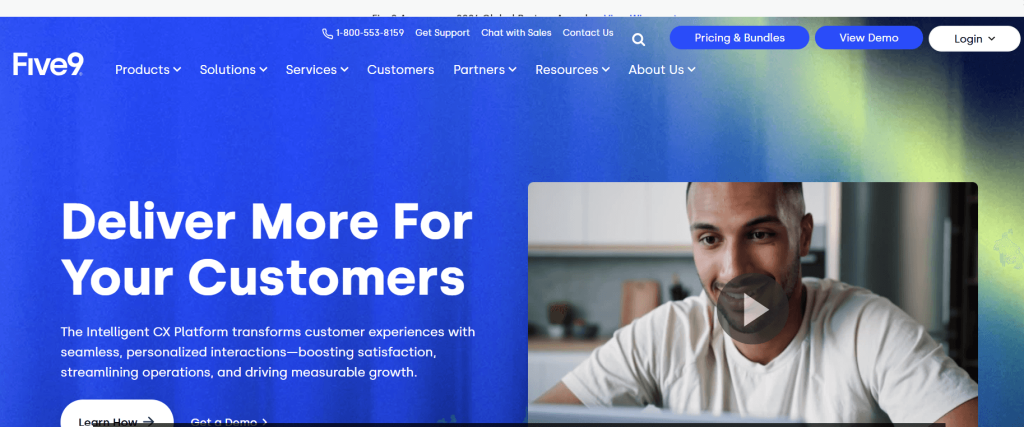
Five9 offers a robust cloud-based contact center solution that blends predictive dialing and AI analytics for call centers with high volume.
Best For:
Large-scale call centers need reliable infrastructure.
Key Features:
Predictive dialing for outbound, real-time performance metrics, integrated automation.
Assets:
- Highly scalable platform for heavy traffic
- Excellent uptime records
- AI-driven enhancements for call routing
- Comprehensive data visualization
- Deep integration with leading CRM software
Liabilities:
- Pricey for small operations
- Requires thorough agent training
- Potential overkill for businesses with modest call volume
- Lacks a simpler interface for quick onboarding
- Minimal out-of-the-box marketing features
6. iCallify
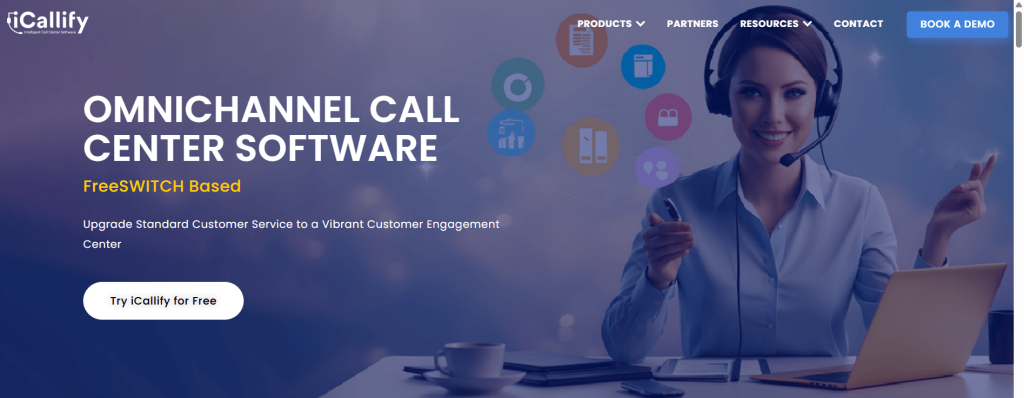
iCallify is a smart call center software that leverages AI to provide real-time insights and optimized processes.
Best For:
Automation, smart IVR, real-time analytics.
Key Features:
Speedy inbound call center software processes, integrated voice bots, robust dashboards.
Assets:
- Affordable options for mid-range budgets
- Adaptable contact center CRM interface
- Good call-monitoring functions
- Provides a range of automation triggers
- Easy to integrate with popular platforms
Liabilities:
- Less recognized brands than larger vendors
- Limited offline community support
- May need extra modules for advanced tasks
- Fewer specialized CRM features for enterprise
- Could require custom development for unique workflows
7. Nimble CRM
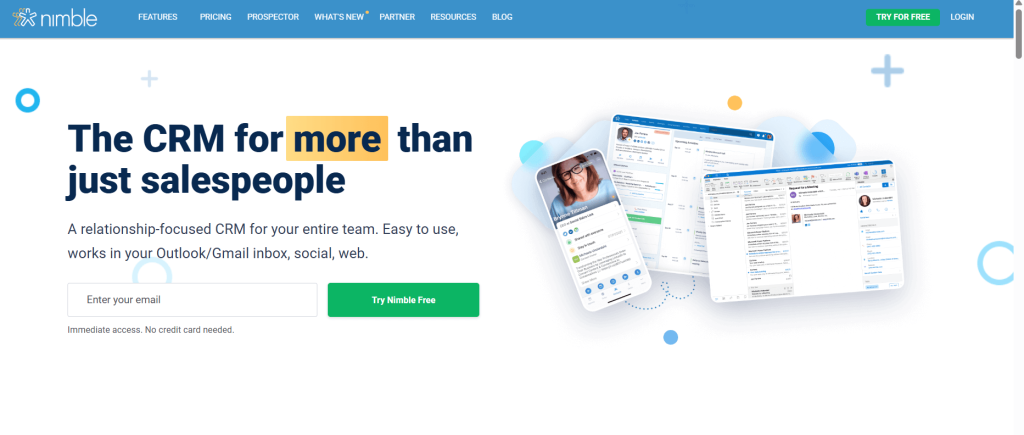
Nimble CRM is a lightweight platform centered on social channels, which makes it a viable option for customer interaction and relationship building.
Best For:
Small to medium-sized businesses needing social media integration.
Key Features:
Unified contact management, social listening, and automation of routine tasks.
Assets:
- Simplified dashboards for quick overviews
- Clear pipeline management tools
- CRM software helps with social channel updates
- Helps personalize interactions with relevant data
- Integrates with commonly used apps
Liabilities:
- Might lack advanced workforce optimization features
- Not specifically tailored for heavy inbound call volume
- Fewer enterprise-grade management tools
- Some expansions require additional fees
- Primarily aimed at smaller business processes
Implementation Guide: How to Integrate CRM into Your Call Center
Steps to a Successful CRM Integration
- Identify Pain Points: Determine whether you need a tool that call center agents can use for inbound or outbound communication.
- Select the Right CRM: Look for an affordable choice that suits your scale and contact center.
- Plan the Integration Process: Decide which channels and services need connectivity, from call center software to ticketing system flows.
- Train Your Team: Offer workshops on how to use contact center CRM and highlight how it can address customer requests quickly.
- Monitor and Optimize: Perform frequent audits to see if the CRM also supports flexible improvements in daily operations.
Future Trends in Call Center CRM Technology

AI and Automation in CRM
Machine learning and automation are revolutionizing the contact center. These technologies help call centers to personalize interactions, predict customer needs, and automate tedious tasks. According to a recent report, 65% of organizations have already embraced CRM systems with generative AI in customer satisfaction and agent performance.
Cloud-Based CRM Adoption
A cloud-based architecture is attractive to companies that desire rapid scaling. This type of deployment tends to have stronger security measures, less on-premise hardware expense and fits well with remote team setups. Transitioning to a cloud-based contact center can decrease overhead, resulting in an environment where management has a greater ability to manage day-to-day metrics.
Personalization and Customer Experience
Customizing every conversation to meet customer needs can increase customer loyalty. Data-driven interaction tools, such as call center customer relationship management software, enable easier monitoring of the customer journey and the identification of potential upsell opportunities. As technology continues to advance, more in-depth analytics will enable companies to better optimize how they incorporate new channels and enhance customer interactions.
Conclusion

Choosing the most suitable call center CRM software can be a turning point for any center that wants to enhance customer results. By opting for one of the top 7 call center CRM solutions featured here, companies can integrate contact center CRM software capabilities with streamlined workflows, powerful analytics, and strategic automation. Embracing the right CRM solution is not just about ticking boxes. It also strengthens customer satisfaction, brings more efficiency to center operations, and helps you manage customer interactions seamlessly.

